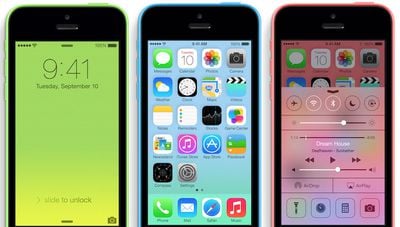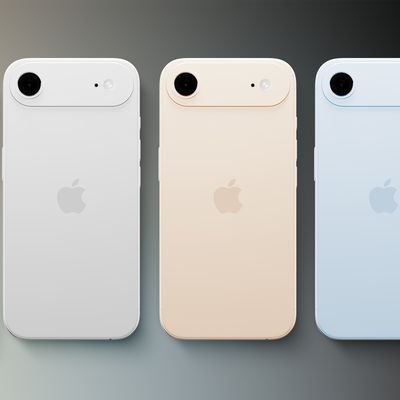Apple Ordered to Help FBI Recover Data From San Bernardino Shooter's iPhone 5c
A U.S. Federal judge today ordered Apple to help federal investigators access data on the iPhone 5c used by San Bernardino shooter Syed Farook, reports NBC News. According to court papers, Apple "declined to provide [assistance] voluntarily."

The judge ruled Tuesday that the Cupertino-based company had to provide "reasonable technical assistance" to the government in recovering data from the iPhone 5c, including bypassing the auto-erase function and allowing investigators to submit an unlimited number of passwords in their attempts to unlock the phone. Apple has five days to respond to the court if it believes that compliance would be "unreasonably burdensome."
Prosecutors argued that despite providing a warrant authorizing the search of Farook's device, the "government was unable to complete the search because it cannot access the iPhone's encrypted content." The FBI argued that Apple has the "technical means" to assist the government and, in a statement, U.S. attorney Eileen M. Decker said that the order was a "potentially important step" in finding out "everything we possibly can" about the San Bernardino attack.
Authorities said they were able to access several backups of Farook's iCloud data, which were saved a month before the attack took place. Prosecutors argued that the evidence in his iCloud account indicated he was in communication with both his victims and his wife, who assisted him in the attack. They allege he may have disabled iCloud data saves after that point to hide further potential evidence.
Last October, the Cupertino company reiterated that it "would be impossible" for the company to access data on a device using iOS 8 or later, but federal authorities are asking Apple to disable a feature that erases the iPhone's data after a certain number of failed password attempts. It's not clear if Apple is able to do so.
Apple stopped storing encryption keys after the release of iOS 8, making it impossible for the company to bypass passcodes to gain access to a device. Additionally, Apple CEO Tim Cook has consistently insisted that providing back-door access past its encryption for authorities would open the door for "bad guys" to gain access to its users' data.
Note: Due to the political nature of the discussion regarding this topic, the discussion thread is located in our Politics, Religion, Social Issues forum. All forum members and site visitors are welcome to read and follow the thread, but posting is limited to forum members with at least 100 posts.
Popular Stories
Apple will launch its new iPhone 17 series in two months, and the iPhone 17 Pro models are expected to get a new design for the rear casing and the camera area. But more significant changes to the lineup are not expected until next year, when the iPhone 18 models arrive.
If you're thinking of trading in your iPhone for this year's latest, consider the following features rumored to be coming...
A new Apple TV is expected to be released later this year, and a handful of new features and changes have been rumored for the device.
Below, we recap what to expect from the next Apple TV, according to rumors.
Rumors
Faster Wi-Fi Support
The next Apple TV will be equipped with Apple's own combined Wi-Fi and Bluetooth chip, according to Bloomberg's Mark Gurman. He said the chip supports ...
Apple's next-generation iPhone 17 Pro and iPhone 17 Pro Max are only two months away, and there are plenty of rumors about the devices.
Below, we recap key changes rumored for the iPhone 17 Pro models.
Latest Rumors
These rumors surfaced in June and July:A redesigned Dynamic Island: It has been rumored that all iPhone 17 models will have a redesigned Dynamic Island interface — it might ...
Apple does not plan to refresh any Macs with updated M5 chips in 2025, according to Bloomberg's Mark Gurman. Updated MacBook Air and MacBook Pro models are now planned for the first half of 2026.
Gurman previously said that Apple would debut the M5 MacBook Pro models in late 2025, but his newest report suggests that Apple is "considering" pushing them back to 2026. Apple is now said to be...
iPhone 17 Pro and iPhone 17 Pro Max models with displays made by BOE will be sold exclusively in China, according to a new report.
Last week, it emerged that Chinese display manufacturer BOE was aggressively ramping up its OLED production capacity for future iPhone models as part of a plan to recapture a major role in Apple's supply chain.
Now, tech news aggregator Jukan Choi reports...
The long wait for an Apple Watch Ultra 3 is nearly over, and a handful of new features and changes have been rumored for the device.
Below, we recap what to expect from the Apple Watch Ultra 3:Satellite connectivity for sending and receiving text messages when Wi-Fi and cellular coverage is unavailable
5G support, up from LTE on the Apple Watch Ultra 2
Likely a wide-angle OLED display that ...
In select U.S. states, residents can add their driver's license or state ID to the Wallet app on the iPhone and Apple Watch, providing a convenient and contactless way to display proof of identity or age at select airports and businesses, and in select apps.
Unfortunately, this feature continues to roll out very slowly since it was announced in 2021, with only nine U.S. states, Puerto Rico,...
The iPhone 17 and iPhone 17 Air will be available in a total of nine color options, according to new information coming out of Asia.
The iPhone 17 Air's expected color options.
According to the leaker going by the account name "yeux1122" on the Korean blog Naver, accessory manufacturers are now producing camera protector rings for the iPhone 17 and iPhone 17 Air in colors to match their...





















